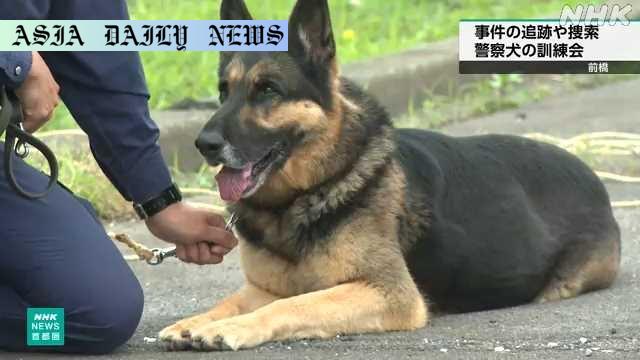Police Dogs: Joint training held for police dogs in Maebashi City, focusing on tracking crime suspects and missing people.

Innovative Training for Police Dogs in Maebashi City
The eastern Japanese city of Maebashi recently hosted a joint training session for police dogs, with the primary aim of honing and enhancing their abilities in crime suspect tracking and missing person searches. Among the participants were eight diligent canines, two of which were raised by the police department, while private-sector trainers nurtured the remaining six. The event demonstrated how collaborative efforts can pave the way for better-polished emergency responder programs.
During this advanced exercise, the dogs tackled real-world scenarios demanding acute focus and determination. Beginning with a scent taken from an article of clothing belonging to a suspect or missing person, the dogs trailed the scent path over asphalt surfaces, mirroring challenging urban conditions. The exercise culminated in finding a wooden object representing possessions of the individual being tracked. When successful, the dogs exhibited their training by assuming a prone position, signaling their findings to the handlers.
The Rising Impact of Police Dogs
In Gunma Prefecture alone, police dogs were mobilized over 230 times last year. These canine officers have proved invaluable, not only in criminal investigations but also in the critical task of locating missing individuals, sometimes saving lives in the process. The recent practice session underlined the instrumental role these animals play, and the dedication both trainers and dogs bring to ensuring effective outcomes.
Trainer Sunaga Takehiro emphasized the substantial progress observed during the event, highlighting the boost in the dogs’ confidence and self-reliance. This development translates directly to better performance in real-world scenarios, where quick thinking and independence are crucial factors in achieving successful missions. Such training programs also provide new trainers, some of whom may feel anxious, an opportunity to receive guidance and build trust with their furry counterparts.
Building Trust and Excellence
One of the notable outcomes of the event was the strengthening of the bond between trainers and the dogs. Confidence-building measures were taken to ensure novice trainers could actively participate and learn critical skills. First-time participants expressed initial nervousness but found solace and empowerment in the support and mentorship of experienced mentors. They left with renewed confidence, emphasizing mutual trust as the foundation of successful collaboration between trainer and canine.
Such collaborative and comprehensive training sessions do not merely boost the dogs’ technical skills but also touch upon vital soft skills, such as communication and teamwork. As a collective, trainers unanimously voiced their hopes for the dogs to not only set examples in law enforcement but also save as many lives as possible in the years to come.
Looking Forward
Joint police dog training sessions like the one in Maebashi City highlight the integration of discipline, trust, and professionalism that underpin their success. Aiming for enhanced situational readiness, these sessions equip the dogs with the skills needed to handle challenges head-on in both urban and rural landscapes. The emphasis on partnerships—between police departments, private-sector trainers, and their dogs—teaches valuable lessons about teamwork and efficiency.
It is apparent that the future holds further advancements for police canine programs across Japan. With consistent training and commitment to improvement, their contributions to public safety will undoubtedly continue to grow, becoming a cornerstone of contemporary law enforcement.
Commentary
The Critical Role of Police Dogs
The remarkable efforts seen during the police dog training session in Maebashi City remind us of the immense potential of canine companions in law enforcement and emergency search missions. These four-legged officers demonstrate not only skill and intelligence but also true dedication to their handlers. Such events are essential, providing a platform to sharpen their natural instincts and refine technical abilities under real-world conditions.
Collaboration Between Trainers and Dogs
The session’s dual focus—on the dogs’ capabilities and the trainers’ adaptation to their partners’ needs—speaks volumes about the importance of trust in this dynamic. Novice trainers learning to work with these talented dogs indicates a future rich in synergy. Everyone involved, from seasoned handlers to newcomers, contributes to ensuring that training produces tangible results.
Why These Initiatives Matter
In a broader perspective, such collaborative police-private training initiatives reflect a commitment to public safety. They symbolize how much can be achieved when institutions and individuals come together for a shared goal. From preventing crimes to finding lost loved ones, these programs bring humanity and determination to the forefront, powered by unconditional loyalty from our canine partners.
Such investments—in both trainers and dogs—demonstrate the growing importance of ethical training methodologies. With the knowledge that these animals contribute to saving lives, one cannot overstate their critical role in modern law enforcement. The Maebashi City session should set an inspiring precedent for similar projects worldwide.


